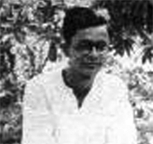Sen, Samar
Sen, Samar (1916-1987) poet and litterateur was born at Bagbazar in Calcutta on 10 October 1916. His father Arun Sen was a professor of history at Bishwa Bharati University. Eminent folk researcher dinesh chandra sen was his grandfather.
Samar Sen did his matriculation in 1932 from Calcutta's Kashimbazar School, IA in 1934 from Scottish Church College, BA honours in English language and literature in 1937 from Calcutta University and MA from the same university in 1938. Although Samar Sen was intellectually influenced by Marxist leaders Radharaman Mitra and Bankim Mukhopadhyay, he did not directly involve himself in politics.

For some time Samar Sen taught as a lecturer at Provatkumar College at Kanthi and the Commercial College in Delhi. A major part of his professional life was spent in journalism. He worked with the Statesman, Hindustan, Standard and Now. He also worked with the news department of All India Radio’s Calcutta station, with an advertising company and as a translator with the Progressive Publishers in Moscow. He was the founder editor of Frontier.
He declared his strong loyalty to Marxism by saying 'I am not a romantic poet, I am a Marxist'. His poems decisively reflect the character and inconsistencies of urban life. His restless search for light made him awry looking at the shocks of the shadowy life but his expression of bitterness has never been too strong. The language of his derision is however sharp, piercing and targeted. He distinguished himself in uncovering the garb of his own middle class.
He felt that the conflicts generated by economic, social, state and international instabilities were tearing the middle class apart. His poems uncover the guise of human feelings of love and affection of the middle class to expose its heart-breaking face of constant wavering, self-seeking. His voice against the mental imbalance of the middle class is strong, spontaneous and targeted. His poems are a mirror of the conflicts of the contemporary society. His poems do not ask for a surrender to the misfortunes of the time, rather they inspire to unite to look for a prosperous and bright tomorrow. His positive approach to life is clearly inspired by the Marxist philosophy of faith in human endeavor. Such optimism is visible as the essence of his poems. It speaks of the faith that the social stagnation of the capitalist system will disappear under the classless post-revolution socialism. Towards this end, his poems, true to his own philosophy, constantly exposed the hollowness of the decadent capitalist society. In depicting the picture of dreary life in his poems, he often took recourse to hard prosaic reality that was not devoid of poetic calm. His method of expression is devoid of accompaniments. He engages his readers in the poetic fabric of his own experience without a prologue. Consequently, the known world around become the staple of his poems.
Some of his well-known books of poems are: Kavita (1937), Grohan (1940), Nana Katha (1942), Khola Chithi (1943), and Tin Purush (1944). His autobiography Babu Brittanta was published in 1978. He died on 23 August 1987. [Tareq Reza]
